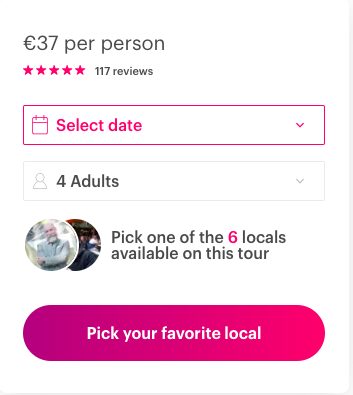
OK, now we are a serious industry, lets agree on the name
July 26th, 2019
by Alex Bainbridge
The tours & activities industry in recent years has become the next big thing. But one aspect we collectively haven’t quite resolved yet is the name of the industry.
Over and above that somewhat fundamental point, we also don’t have an accepted name for those tasked with introducing customers to product / services, nor those with delivering that product / service.
Lets resolve this together.
Does what we call things matter?
This may seem unimportant but what we call things really does matter. Think of influencer marketing. If we called this freelance seo optimisation, or freelance content creation experts, it would infer a completely different concept for pretty much the same thing. The name infers both the problem and the approach to the solution.
So, like it or hate it, how you name something matters. Right, back to the problem at hand.
The three missing names
The thee names we have a problem with are:
- The industry! Are we tours & activities? What about attractions? What about experiences? Do we include multi-day?
- Suppliers or are they operators?
- Online travel agents or are they something else?
Lets take each name in turn and muse on what we should be calling them.
Tours & activities industry
I remember back in the mid 2000s we had no name for our industry.
Then in 2009 tnooz launched (now Phocuswire) and became the leading publication of the era. It had writers (nodes) from our sector including Alex Kremer (Flextrip, Redeam, Arival), Stephen Joyce (Rezgo) and myself (TourCMS, Autoura). We collectively called the industry tours & activities from early on. This is probably because attractions came from a different evolutionary start point and Alex, Stephen and I were tour & activity people, not attraction people, so we naturally talked about tours & activities. Because we wrote so much at the time the name stuck.
I coined the phrase “T&A” in 2011 as a joke because, at least to people from the USA, it means something quite different. The first public use of that acronym was in 2011 on what became quite a key blog post of the era. I had T&A on my TourCMS swag t-shirts from the time, yep. Do you have one? Its still my twitter profile!
So, tours & activities was Alex, Stephen, Kevin May (editor) and myself. T&A, its my fault.
Having been somewhat responsible for where we are today, I do feel I have a role in fixing the situation ;0
The problem with tours & activities
I haven’t been massively happy with this industry name for a while. The nouns are too much about the solution, not about the customer problem. We also get very confused when we incorporate attractions, events & experiences as are we the tours, activities, events, experiences & attractions industry? A mouthful.
We have left ourselves no room for innovation as by stating the solution, we tend to innovate leaving those concepts in place
Think restaurants being disrupted by street food. If you spend your life talking about restaurants as the noun, street food is not an obvious direction to go.
Or think of the hotel industry disrupted by private accommodation (Airbnb). If you look through the lens of hotels, you innovate in hotels. Instead you need to be thinking about beds or perhaps thinking beyond that, thinking about sleep or private space.
Tours, activities, events, attractions…… these are constraining nouns. If you think in this way, you will miss the bigger innovation opportunity.
Getting straight to it, my proposal for the new name of the industry is sightseeing & experiences.
Justifications & thoughts
- Sightseeing definition: The act of visiting and seeing places and objects of interest. This covers tours plus sequences of places to visit… e.g. trip planning. Does not infer that is a commercial product, but still could be
- Experiences covers a variety of individual things to do. Does not infer this is a commercial product, but still could be
- Doesn’t infer if the person taking a product / service is a local or a tourist. (An alternative suggestion for a new industry name – “in-destination” infers you are not local. We should include locals taking experiences within our industry definition, as a result in-destination doesn’t work)
- Repositions attractions as something you do within a wider context – you are just one thing within a sequence of places of interest
- Everyone knows what it means immediately. These are words we already use
Are we all good with that?
Good news with Sightseeing & EXperiences is there won’t be any problems with the acronym that T&A had….
My action: I have updated my company presentations, social media profiles etc and now use sightseeing & experiences as the industry name. Join me if you like.
Operators vs suppliers
Now someone has to provide these amazing sightseeing & experiences products / services. What do we call these companies?
The Arival team invites everyone working in the Best Part of Travel – tours, activities and attractions – and especially OTAs and distributors, to use “operator” rather “supplier” when referring to the owners and operators of experiences. Experiences are not defined by distribution. It’s the other way around. They are the reason people travel. They are the thing.
Now I kind of like this shift from supplier to operator. I can see what Douglas means – they want to level the playing field, supplier vs online travel agent (OTA) seems a bit subservient when the truth is the current situation is more of an equal partnership. At a very top level I see what Douglas is suggesting and see why, as a brand focussed on operators / suppliers, you would want to put them at the centre that everything else orbits around. OK.
The evolution of the market also supports this shift from suppliers to operators.
Over and above Douglas’s justification, I would say if you define your own product / service, you are a supplier. If you provide someone else’s product / service that you have not designed, you are an operator.
Currently “suppliers” design their own tours and make them available to retailers. In the future, the retailer defines the tour, and the supplier “operates” it.
e.g. Take a look at this WithLocals experience. WithLocals has designed it and 6 local tour companies (or local guides in their case) operate it. This is the model of the future:
In this example, suppliers are absolutely operators not suppliers. This is the future.
Its like being a chef in a franchise restaurant rather than an independent restaurant. Yes you are still cooking, but you are cooking to someone else’s menu. That makes you an operator not a supplier.
The next question is do suppliers WANT to be operators? Or do they want to be suppliers? (in my definition). That I don’t know. This industry is dominated by people who are doing it as a lifestyle so perhaps there is a big group who just love dealing with customers and if they are delivering an experience designed by a retailer (e.g. acting as an operator) this is perfectly fine. Others in the sector care about building up their own independent brands and want the ability to define their own products how they see fit. To me, these folk will always be suppliers not operators.
Summary – I agree the future is that suppliers will become operators. I expect this debate to become much more vocal in the coming years as companies like GetYourGuide, Airbnb, Klook etc move into operating their own experiences….. as for this they will need operators…… while at the same time they will be a retailer of existing products, for which they need suppliers. Confusing – yes.
My action: We still call these companies suppliers within Autoura. We did not shift to operator, although I did think about it for a while. In our context the suppliers define their own product so in my thinking if they define the product they are a supplier.
Online travel agents (OTAs)
Now naming this part of the sightseeing & experience industry is hard. These are the upstream companies closest to the customer.
Fundamentally:
- Online – Most OTAs are not selling online now, they are using mobile, voice, concierges etc etc…. the online word is obsolete
- Travel – Infers the customer is not local. But our industry needs to be more inclusive…. if you run an escape room attraction you probably care more about your local customers than your tourist customers
- Agent – Not all demand creating companies are running on a retail model…..
So all 3 words within an OTA acronym are not fit for purpose. OTAs can be not online, not focussed on tourists and not running a retail trading model. Hummm
Summary – er I don’t have a solution for this quite yet 😉 Its not distributors as explained above, that assumes the supplier has designed a product that is distributed…. when the future could be the customer facing company does the product design and the operator operates it. Can’t be OTAs as just explained.
My action: I call these folk affiliates in Autoura. I know affiliates has a kind of connotation to it, including that they do not handle customer money, but ultimately its a term that everyone understands is responsible for creating demand, so works for the moment. Agent also has many problems in the USA where agent can mean staff member, in certain contexts.
Overall
I accept naming things is not the most exciting thing to write about.
However we have moved our industry to the point we have several (3?) unicorn businesses (GetYourGuide, Klook, Veltra) so its probably about time we got our naming in order!
Photo: A Street Called Awesome by Selena N. B. H. (CC BY 2.0) (Source) – Perhaps we should just call this industry the awesome part of travel

This content is protected by copyright. Link sharing is encouraged but duplication and redistribution is illegal



Comments also via LinkedIn https://www.linkedin.com/feed/update/urn:li:activity:6560303308542656512
Back in the 1990s in the USA we divided the craft of touring into heritage development and heritage tourism (in the East) and cultural tourism, mostly out West. East: Place/Space; West: Events/Time. “A beach with ballet is a better beach,” said the ex director of the LA CVP.
“Getting there” involves “getting” and “there,” meaning the trip and the destination. Now, and in our workaholic future, at least in the USA, time constraints are more important than space constraints. For that reason,
TIME FOR TRAVEL (T4T), while indirect, is both user friendly and is a set-up for the AV tour, activities, events and attractions involving or at least implying the question, When and for How Long? instead of Where and for What?
Alvin
author of The Muscle Shoals
Great article! The name change has been long due. The term ‘Sightseeing’ seems a bit redundant especially once combined with ‘Experiences’ because isn’t sightseeing also an experience? How about- ‘Destination Experiences’?
ON suppliers vs operators? Definitely agree! Better still to call them ‘partners’ in day to day internal communications 🙂
Thanks for posting this brilliant article.